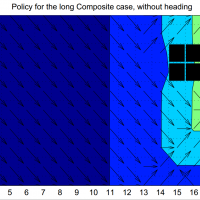Air Traffic Control is a key system that enables safe and efficient air transportation. However, it is not expected to have the necessary flexibility to be able to cope unaugmented with the large foreseen increase in air traffic within the coming decades. Consequently, increasing levels of automation are being introduced within the ATC system, creating a highly interdependent human-machine system. To address the peculiarities of such a biphasic system and simultaneously exploit the strengths of modern Artificial Intelligence techniques, the present article explores the possibility of drawing upon human behaviour to develop a piece of automation that is compliant with human-centred automation guidelines. Reinforcement Learning algorithms are employed to develop an automated short-term conflict solver for ATC problems. Employing task decomposition, the classical formulation of RL is modified to address issues such as flexibility and generalisation. The resulting solver is showed to be able to address simple problems and to possess good potential with respect to ATC. An analysis of convergence speed as a function of the exploration parameter is also provided, showing that the optimal amount of exploration depends on the time at one’s disposal.
Msc Thesis project from: Riccardo Puca


